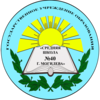Урок английского языка в 10 классе “My Dream House”
Дата публикации: 14 августа 2012
Учитель английского языка
первой категории
Карабанова Светлана Сергеевна
Тема: My dream house
Цели урока:
- Обучающие:
- совершенствовать лингвистическую и речевую компетенцию во всех видах речевой деятельности, путемобобщения единичных знаний по теме в систему;
- совершенствовать языковую компетенцию (систематизация ранее изученного материала);
· Практическая:совершенствовать навыки устной речи по изученной теме, умение подготовить связноевысказывание по теме.
- Развивающие:
- развивать языковые, интеллектуальные и познавательные способности учеников;
- развивать воображение при моделировании ситуаций общения
· развивать способности к осмыслению восприятия, к распределению и к увеличению объема внимания, слуховой и зрительной дифференциации.
- Воспитательные:
- воспитание культуры и потребности в практическом использовании языка в различных сферах жизни;
- воспитание и развитие толерантности и самооценки.
- воспитание потребности и способности понимать образ жизни других народов, умение работать в сотрудничестве с товарищами, личная и взаимная ответственность
Ход урока.
I.Введение в атмосферу иноязычного общения. Организационный момент. Сообщение темы и цели урока
Teacher:Good morning, students! I hope you are well and ready to work!
II. Целеполагание
Teacher:I’d like to start our lesson with a poem. Listen to it and try to guess the key word of our lesson. (Слайд1)
“I’m looking for a house,”-
said the little brown mouse.
“ With one room for breakfast,
one room for tea,
one room for supper
and that makes three.
One room to dance in,
When I give a ball.
A kitchen and a bedroom-
six rooms all”.
Teacher:What are we going to talk about at the lesson?
Pupils: (house)
Teacher:So, the topic of the lesson is “My dream house” I think, every person has his own idea of a perfect house. The main thing we are going to discuss today is a house and a flat which you would like to have in the future.(Слайд2)
III. Речевая разминка.
There are a lot of proverbs about houses and homes in Russian. In English is the same. And one of the proverbs is… (My home is my castle)(Слайд3)
How do you understand this proverb?
Do you agree with it?
IV. Презентация
Take your seats at the computers and look at the screen and study the presentations very thoroughly. In this presentation you will revise different types of houses.
(The Presentation for pupils)
T.: So, it’s high time to continue our work. Let’s see what you know about types of houses.(Слайд4)
And now could you remind me what types of houses are popular in Britain?
What is a detached house?
What is a semi- detached house?
What is a terraced house?
What is a cottage?
What is a mansion?
V. Диалогическая речь
And now I’d like to know where you would like to live and why. Discuss in pairs. ( приложение1) (Слайд5)
— Would you like to live in a house or a flat?
— … . And you?
— As for me I …. What type of house would you like to live in?
— … .
— Why?
— I think, it’s… .
VI. Работасвидео. (Video) (Слайд6)
So, I see you would like to live in a house. And now let’s go to a typical English house. But for the Robinsons it’s a dream house. They’ve been dreaming about it for years. Watch a video. Be ready to answer: What rooms are downstairs and what rooms are upstairs? Work in groups and chose a question for your groups. Read your questions. You can make notes.
OK, what rooms are downstairs? (Living room, kitchen and dining-room).
What rooms are upstairs? (Julie’s room, Tom’s room, parent’s room, bathroom, study)
Would you like to live in a house like that?
VII. Физкультминутка.(Слайд7)
Have you ever dreamt about your own flats? Now you’ve got an opportunity to do it. Close your eyes and imagine your dream house or flat.
Wake up, children! Let’s do gymnastics for our eyes:
Look at the ceiling,
Look at the floor,
Look at the window,
Look at the door.
VIII.Активизация грамматических навыков
You know, there are a lot of things/items in our rooms. Look at the screen and say how many things you can see.(Слайд8)
We’ve already learned the plural forms of nouns. Let’s check how you remember everything. Take your seats at the computers and do the test.
(Тест для учеников)
How many points have you got?
IXВосприятие и понимание иноязычной речи на слух.
— предтекстовыйэтап
Open your books at p. 52 ex. 2.
You can see 4 rooms. In groups chose one of the rooms in the photos and describe them. Let your classmates guess which room you have described. You’ve got two minutes to do this task.
You can start with the words: “This room is… ”
— текстовый этап (Слайд 9)
p. 52 ex. 3a
Listen to Sarah describing the rooms of her dream flat. Which of the photos matches the description best?
p. 52 ex. 3b
Listen again. In your groups take notes to complete Sarah’s description.
Please, teams change your papers with each other. Look at the screen and check them. (Слайд10)
How many mistakes have you found?
— послетекстовый этап
p. 53 ex. 3с
Would you like to live in a flat like that? Why?(Слайд11)
X. Чтение
There are a lot of words which can help us to describe a house. Let’s revise some of them. Match the words with their definitions.( приложение2) (Слайд12) Read the words with their definitions.
Use these words to complete the description of a house and be ready to answer.
( приложение3) (Слайд13)
What is the main characteristic of this house?
Would you like in a period or modern house?
XI. Монологическая речь
Imagine a situation. You are architects who have bought a small island and you want to build your dream house. So, you should make projects and present them. But first of all look at the spidergram. Complete it.(Слайд12)
It’s high time to make projects. Use the spidergram and the pictures on your tables.
XII. Д/З(Слайд13)
Write a description of your dream flat.
XIII. Подведение итогов.
You’ve done your work well. You’ve given me much information about houses in Britain, about your dream house. I hope your dreams will come true.
1. And I’d like to know if you were glad with your work?
2. Have you found out anything new today?
3. What information was important to you?
1. For taking an active part at the lesson … and … get an excellent mark. 2. … and … you’ve made some mistakes and your marks are …
Our lesson is over! Thank you for the lesson!










